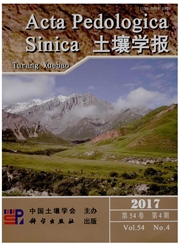

 中文摘要:
中文摘要:
针对城郊农田土壤中多环芳烃和抗生素复合污染的新特征,通过室内模拟土培实验,研究四环素(Tetracycline,TC)胁迫下,降解菌Sphingobium sp.PHE3对长三角典型农田土壤中芘的降解效果和影响机制。研究表明,接种降解菌处理(B)能明显促进土壤中芘的降解,TC的引入可显著抑制土壤中芘的深度降解过程(P〈0.05)。经过90天培养后,B处理与接菌+添加TC处理(BTC)的降解率分别为40.1%、25.7%,较对照分别提高了23.0倍、14.1倍。通过土壤微生物群落结构多样性分析发现,降解菌数量在经历90天的土壤环境适应期后逐渐快速增加,其数量变化与污染物芘在土壤中含量消减趋势呈负相关;引入芘和四环素对土壤细菌群落结构多样性和功能稳定性具有显著影响(P〈0.05),然而对土壤真菌群落影响不显著(P〉0.05)。此外,B和BTC处理条件下,土壤过氧化氢酶活性、荧光素二乙酸酯酶活性和土壤微生物生物量碳氮值显著高于单独添加芘处理(P)和单独添加TC处理(TC),但P处理与TC处理之间无显著差异(P〉0.05),说明外源污染物(芘或四环素)对于土壤酶活性和微生物生物量碳氮具有显著抑制作用(P〈0.05),致使降解菌功能作用受到抑制。综上研究结果表明TC可明显抑制土壤中典型四环多环芳烃的微生物降解过程,针对多环芳烃与抗生素复合有机污染农田土壤的微生物强化修复技术有待深入研究。
 英文摘要:
英文摘要:
An inoculation experiment in thermostatic incubator was carried out to investigate the effects and mechanisms of polycyclic aromatic hydrocarbons(PAHs) degrading bacteria Sphingobium sp.PHE3 inoculation(B) on pyrene dissipation in arable soil co-polluted with tetracycline(TC). The results indicated that PHE3 inoculation significantly increased the degradation rate of PAHs(P〈0.05), while tetracycline existence in the soil obviously inhibited microbial degradation of pyrene in soil. At the end of the 90 days of incubation, the removal rates of pyrene in the treatment with sole PHE3 inoculation and combined inoculation of PHE3 with TC addition(BTC) were 40.12% and 25.72%, respectively, which were 23.0 and 14.1 times higher than that of the control(CK). Meanwhile, a significant increase of soil microbial diversity and function structure were also observed after transient adaptation by PHE3 inoculation to the soil(P〈0.05), suggesting a negative correlation between soil microbial activity and pyrene content in the soil. In addition, soil catalase activity, FDA enzyme activity and soil microbial biomass carbon and nitrogen(MBC/N) in the treatments B and BTC were also significantly higher than those of with pyrene addition(P) treatment and TC treatment. However, no significant difference was found for the soil enzyme activity and MBC/N between P and TC treatments(P〉0.05), indicating that exogenous pollutants had a significant inhibition on soil microbial activity, and B weakened the inhibition. Therefore, it can be concluded that as the typical tetracyclic pollutant, TC can obviously inhibit the biodegradation of pyrene in soil, and the potential threat posed by the tetracyclines from organic fertilizer application has become a concern and need further monitoring for the soil environment.
 同期刊论文项目
同期刊论文项目
 同项目期刊论文
同项目期刊论文
 Adsorption of Trametes versicolor laccase to soil iron and aluminum minerals: Enzyme activity, kinet
Adsorption of Trametes versicolor laccase to soil iron and aluminum minerals: Enzyme activity, kinet Response surface methodology to understand the anaerobic biodegradation of organochlorine pesticides
Response surface methodology to understand the anaerobic biodegradation of organochlorine pesticides 期刊信息
期刊信息
